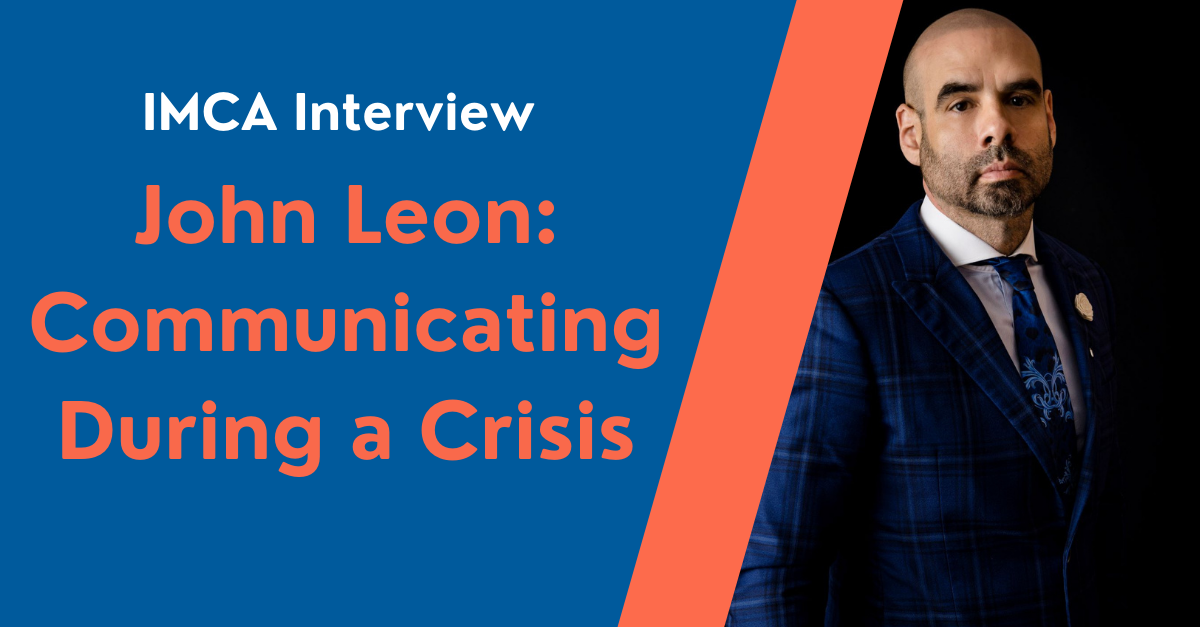WHEN YOU’RE IN THE MIDDLE OF A CRISIS, COMMUNICATING EFFECTIVELY CAN BE TOUGH. ATTORNEY JOHN LEON TELLS INSURANCE TEAMS HOW TO PREPARE.
By Amy Hourigan, director of marketing at HAI Group and IMCA board member
Amy Hourigan: Great to talk with you, John. It’s not every day that we have access to a leading attorney who specializes in crisis communications, so let’s dive right in. Insurance marketing and communications teams are used to handling crisis communications, but the pandemic really tested our preparedness. Before we discuss strategy, can you tell us how you define a crisis?
John Leon: Sure. A crisis is a problem that impacts a company across several areas: operations, image, morale, and even the reputation of its leaders.
AH: Is it possible to prepare for a crisis?
JL: As has often been said, an ounce of prevention is worth a pound of cure. All corporations should have a lawyer who can establish the legal standards and protocols to which the company has to abide. Those protocols should then be coupled with some kind of training, which can go a long way toward preventing relatively small situations from becoming an issue—whether with the work culture, operations, or management. A properly trained staff is the best preparation because any situation can be fixed or altogether avoided long before it becomes a crisis.
AH: If a full-blown crisis occurs, who should respond for the company?
JL: In most situations it’s best for the CEO to address the situation. That’s the best way to assure your employees that you have everything under control. It’s also the best way to demonstrate to [any] shareholders and your clients that the company has the right kind of leadership that can steer the ship in the right direction despite any storm in the horizon.
AH: What type of training should the spokesperson receive?
JL: Whether it’s the CEO or not, the spokesperson should have media training on how to prepare a strong statement, how to deliver it, and how to respond to questions. Many spokespeople are not prepared for the pressure. How to appear in front of a camera, how to dress, the tone of your delivery, how to reply to questions—specifically, not just to adequately address the questions but also to be aware of the kind of audience who will be listening to your responses—these all require training.
AH: Besides making sure their spokesperson is trained, are there steps insurance communications teams should follow when addressing the crisis?
JL: There are basic steps to follow in a crisis like gathering information and making sure you have all the pertinent facts, assessing the situation, and making a plan. But there isn’t a one-size-fits-all model. Circumstances will prescribe the most strategic course of action, which usually involves acknowledging the issue, expressing sympathy, and announcing an action plan. But not in all cases. I’m often brought it so I can, if possible, prevent things from reaching the point where it becomes necessary to do all that.
AH: Do you recommend a holding statement?
JL: If called upon by the media and you aren’t ready [to talk], a holding statement would be best, yes. You really don’t want to get ahead of yourself and issue a denial if the facts won’t support it.
AH: How important is it for the company spokesperson (or people) to stay on message?
JL: Going off message is dangerous, which is why you start by making sure the message is solid. A spokesperson going off message can cause untold problems that may have unanticipated or even legal repercussions. This is where you need someone who has had sufficient media training.
AH: How quickly should the company move? Is it better to move immediately and risk saying something wrong or wait until you have a plan and risk responding too slowly?
JL: Depending on the situation and considering the media cycles we now have, I would say a company only has hours to get a crisis management consultant on hand and their plan in place. It’s best not to make any moves until you do. So if the story has broken, you should be ready with some kind of response in a day’s time.
AH: Should you respond to every social media comment?
JL: I would advise not to until the official statement has been given. That way, any social media strategy has already been laid out to align with the company stance. Social media is an unforgiving place to be judged. Even a relatively small infraction can be amplified.
AH: When should a company consult with an attorney?
JL: Companies should have a corporate lawyer anyway, but in matters of a crisis, I am often consulted before things escalate—I come in so that the issue doesn’t reach a point when you will need representation against litigation. It really depends on the company’s foresight. Attorneys are often needed early on, especially if certain negotiations are going to be managed properly and legally.
AH: What is the biggest mistake you see companies making when they’re facing a crisis?
JL: The biggest mistake might be that management thinks they can deal with the crisis on their own. Many are ill prepared to handle or manage a crisis. And this presumption often leads to even more complicated problems. Things inevitably spiral out of their control.
AH: Do you recommend a post-crisis evaluation?
JL: Absolutely. Even if a crisis has been averted, if the root causes have not been addressed, it can and will happen again. As I said, an ounce of prevention…


